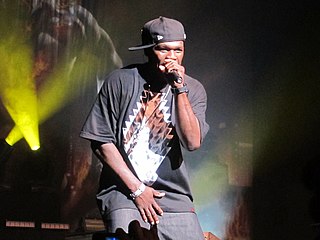
Rapping is an artistic form of vocal delivery and emotive expression that incorporates "rhyme, rhythmic speech, and [commonly] street vernacular". It is usually performed over a backing beat or musical accompaniment. The components of rap include "content", "flow", and "delivery". Rap differs from spoken-word poetry in that it is usually performed off-time to musical accompaniment. It also differs from singing, which varies in pitch and does not always include words. Because they do not rely on pitch inflection, some rap artists may play with timbre or other vocal qualities. Rap is a primary ingredient of hip hop music, and so commonly associated with that genre that it is sometimes called "rap music".

An anachronism is a chronological inconsistency in some arrangement, especially a juxtaposition of people, events, objects, language terms and customs from different time periods. The most common type of anachronism is an object misplaced in time, but it may be a verbal expression, a technology, a philosophical idea, a musical style, a material, a plant or animal, a custom, or anything else associated with a particular period that is placed outside its proper temporal domain.
A number of organizations and academics consider the Nation of Islam (NOI) to be antisemitic. The NOI has engaged in Holocaust denial, and exaggerates the role of Jews in the African slave trade; mainstream historians, such as Saul S. Friedman, have said Jews had a negligible role. The NOI has repeatedly rejected charges made against it as false and politically motivated.

Nathaniel Thomas Wilson, better known by his stage name Kool G Rap, is an American rapper. He began his career in the mid-1980s as one half of the group Kool G Rap & DJ Polo and as a member of the Juice Crew. He is widely considered to be one of the most influential and skilled MCs of all time, and a pioneer of mafioso rap/street/hardcore content and multisyllabic rhyming. On his album The Giancana Story, he stated that the "G" in his name stands for "Giancana", but on other occasions he has stated that it stands for "Genius".
Wigger or Wigga is a term for a white person of European ethnic origin who emulates the perceived mannerisms, language, and fashions associated with African-American culture, particularly hip hop. The term is a portmanteau of white and nigger, or white nigger.

William Michael Griffin Jr., better known by his stage name Rakim, is an American rapper. He is one half of golden age hip hop duo Eric B. & Rakim, with whom he released four albums: Paid in Full (1987), Follow the Leader (1988), Let the Rhythm Hit 'Em (1990), and Don't Sweat the Technique (1992). He also released three solo albums: The 18th Letter (1997), The Master (1999), and The Seventh Seal (2009).
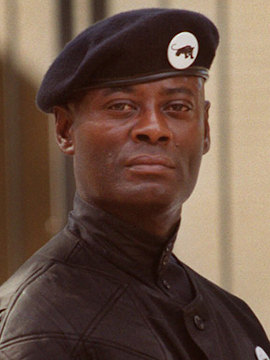
Khalid Abdul Muhammad was an African-American Muslim minister and activist who became a prominent figure in the Nation of Islam and later the New Black Panther Party. After a racially inflammatory 1993 speech at Kean College, Muhammad was condemned and removed from his position in the Nation of Islam by Louis Farrakhan. He was also censured by both Houses of the United States Congress.
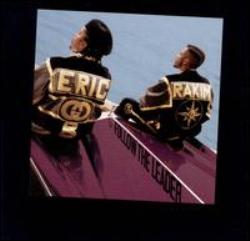
Follow the Leader is the second studio album by American hip hop duo Eric B. & Rakim, released on July 26, 1988. Following their debut album Paid in Full (1987), Eric B. & Rakim left 4th & B'way Records and signed with Uni Records, a subsidiary label of major label MCA Records. They recorded Follow the Leader at Power Play Studios in New York City. The duo produced, composed, and arranged the album with additional contributions from Rakim's brother Stevie Blass Griffin, who contributed with various instruments. Eric B. & Rakim worked with audio engineers Carlton Batts and Patrick Adams on the album. In a similar manner to their first album, a "ghost producer" was brought in for two songs. In a 2007 interview with Unkut.com, The 45 King said he produced both "Microphone Fiend" and "The R". "Microphone Fiend" was originally made for Fab 5 Freddy, until 45 King gave it over to Eric B., the group's "DJ".
The Nation of Islam (NOI) is a black nationalist religious group founded in the United States by Wallace Fard Muhammad in 1930. While it identifies itself as promoting a form of Islam, its beliefs differ considerably from mainstream Islamic traditions. Scholars of religion characterize it as a new religious movement. It operates as a centralized and hierarchical organization. It has been characterized by the Southern Poverty Law Center and the Anti-Defamation League as a black supremacist hate group.
Hip-Hop: Beyond Beats and Rhymes is a 2006 documentary film written, produced, and directed by Byron Hurt. The documentary explores the issues of masculinity, violence, homophobia, and sexism in hip hop music and culture, through interviews with artists, academics, and fans. Hurt's activism in gender issues and his love of hip-hop caused him to feel what he described as a sense of hypocrisy, and began working on the film. The premiere of the film took place at the Sundance Film Festival, and was welcomed by a standing ovation. It has also won Best Documentary at the San Francisco Black Film Festival and the Audience Award at the Roxbury Film Festival. On February 20, 2007 the film aired on the PBS Emmy-winning documentary series, Independent Lens.

The Death of Willie Lynch is the debut album released by Black Ice, an African-American rapper and poet. Although originally signed to Def Jam Records, Black Ice was thankful to have this album released by the indie label Koch Records. Eric "Booty" Greene handled the production for this album.

The Revolution Will Not Be Televised is a compilation album by American poet Gil Scott-Heron. It was released in 1974 by Flying Dutchman Records and titled after Scott-Heron's 1971 song of the same name.
Misogyny in rap music is defined as lyrics, videos, or other components of rap music that encourage, glorify, justify, or legitimize the objectification, exploitation, or victimization of women. It is an ideology that depicts women as objects for men to own, use, and abuse. It reduces women to expendable beings. It might include everything from innuendos to stereotypical characterizations and defamations.
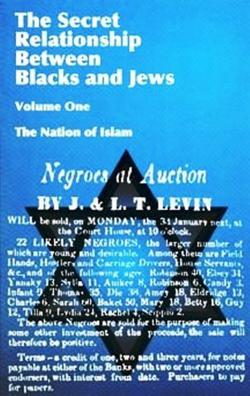
The Secret Relationship Between Blacks and Jews is a three-volume work of pseudo-scholarship, published by the Nation of Islam. The first volume, which was released in 1991, asserts that Jews dominated the Atlantic slave trade. The Secret Relationship has been widely criticized for being antisemitic and for failing to provide an objective analysis of the role of Jews in the slave trade. The American Historical Association issued a statement condemning claims that Jews played a disproportionate role in the Atlantic slave trade, and other historians such as Wim Klooster and Seymour Drescher concluded that the role of Jews in the overall Atlantic slave trade was in fact minimal.

William Jelani Cobb is an American writer, author, educator, and dean of the Columbia Journalism School.
African-American Muslims, also colloquially known as Black Muslims, are an African American religious minority. African American Muslims account for over 20% of American Muslims. They represent one of the larger minority Muslim populations of the United States as there is no ethnic group that makes up the majority of American Muslims. They are represented in Sunni and Shia denominations as well as smaller sects, such as the Nation of Islam. The history of African-American Muslims is related to African-American history in general, and goes back to the Revolutionary and Antebellum eras.
This article summarizes the events, album releases, and album release dates in hip hop music for the year 1979.
Jasiri X is an American rapper and activist who gained attention for his 2007 song "Free the Jena 6." He is a recipient of the Rauschenberg Artist as Activist award and co-founder of anti-violence group 1Hood. In 2016, he was awarded an honorary doctorate from the Chicago Theological Seminary.
A number of hip hop artists in the United States are followers of Islam. Although some Muslims believe some or most forms of music are haram, these artists do not necessarily consider themselves as practicing orthodox Muslims.
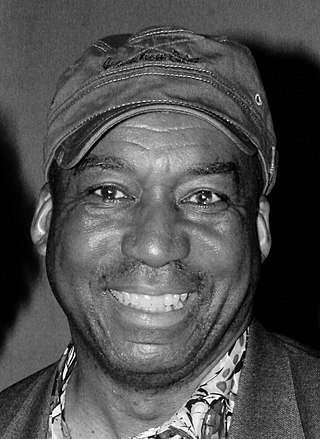
James G. Spady was an American Book Award-winning writer, historian, and journalist. Over his fifty-year career, Spady authored and edited numerous books, worked in radio, television, and film, wrote hundreds of newspaper articles for various print media, and received the National Newspaper Publishers Association's Meritorious Award.











